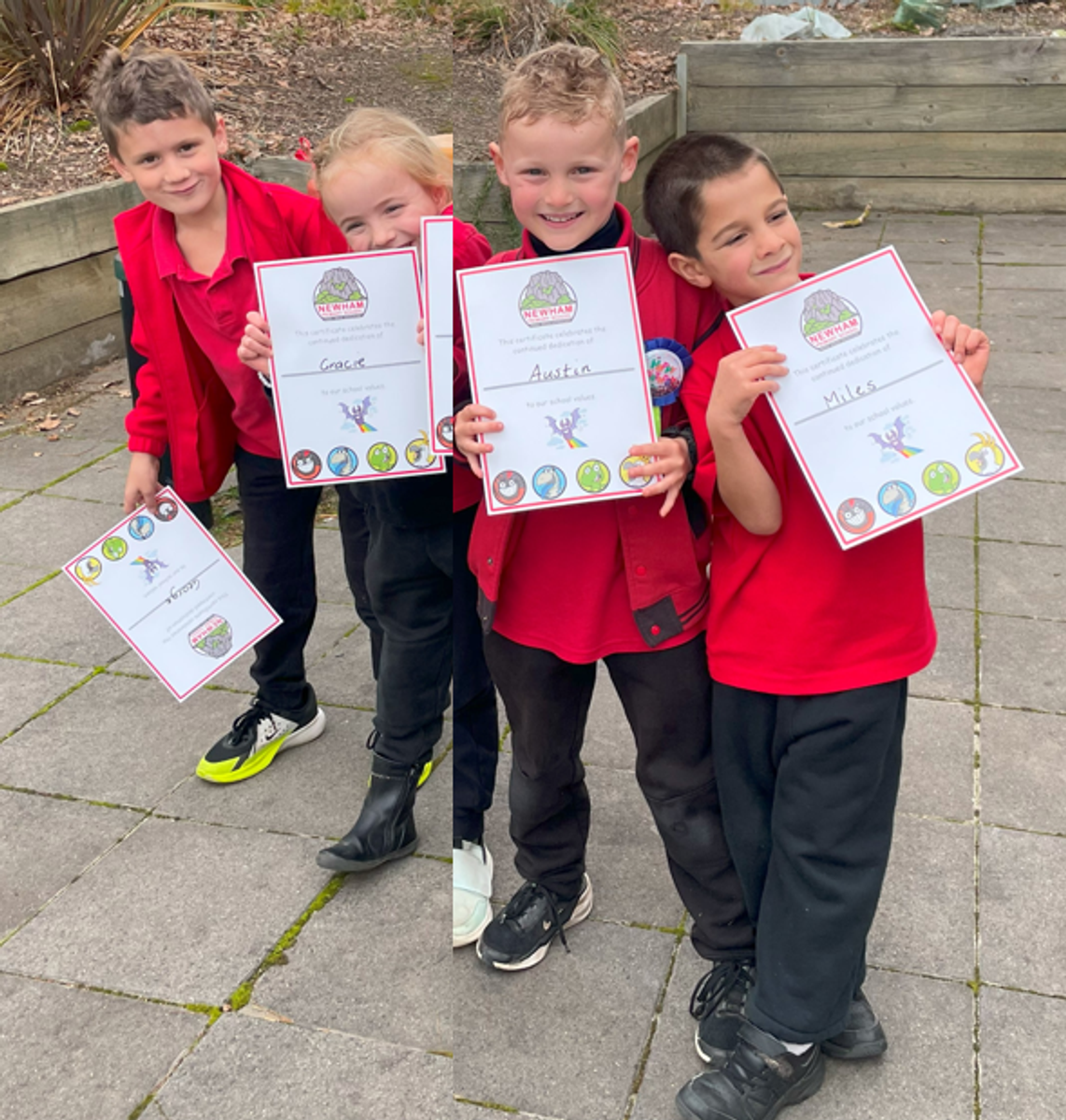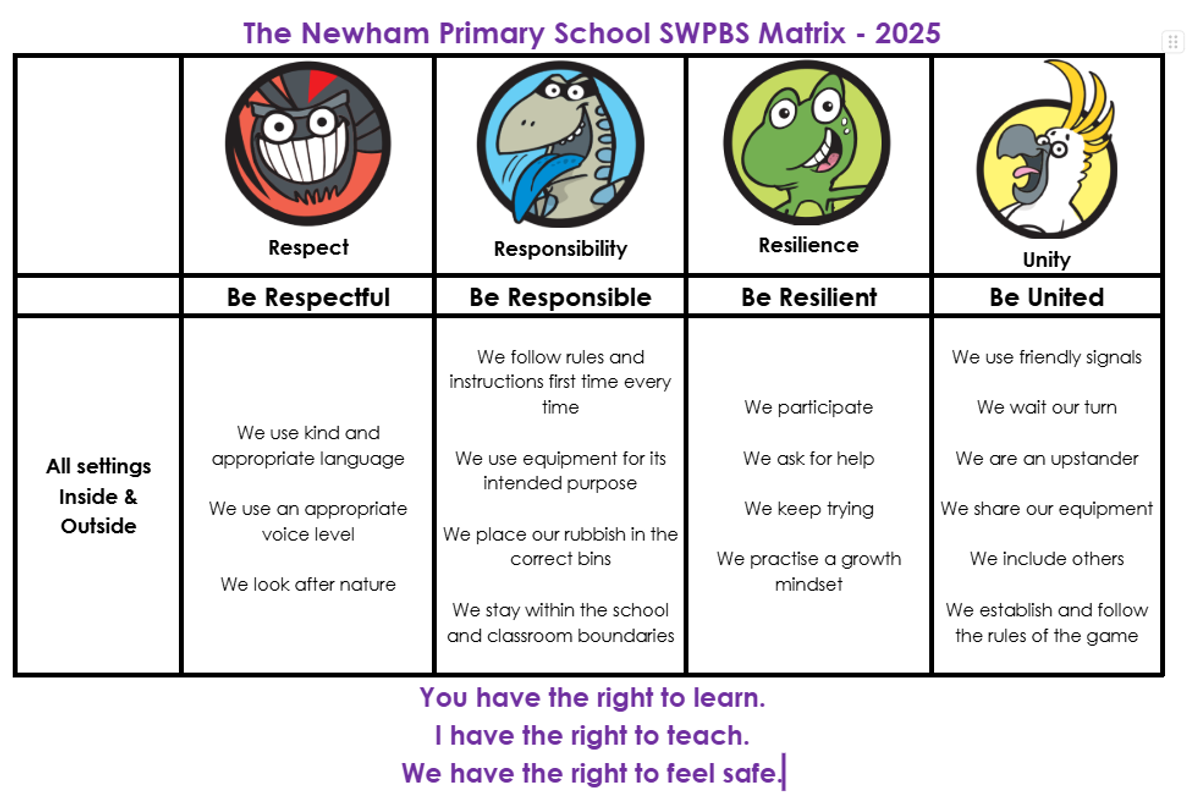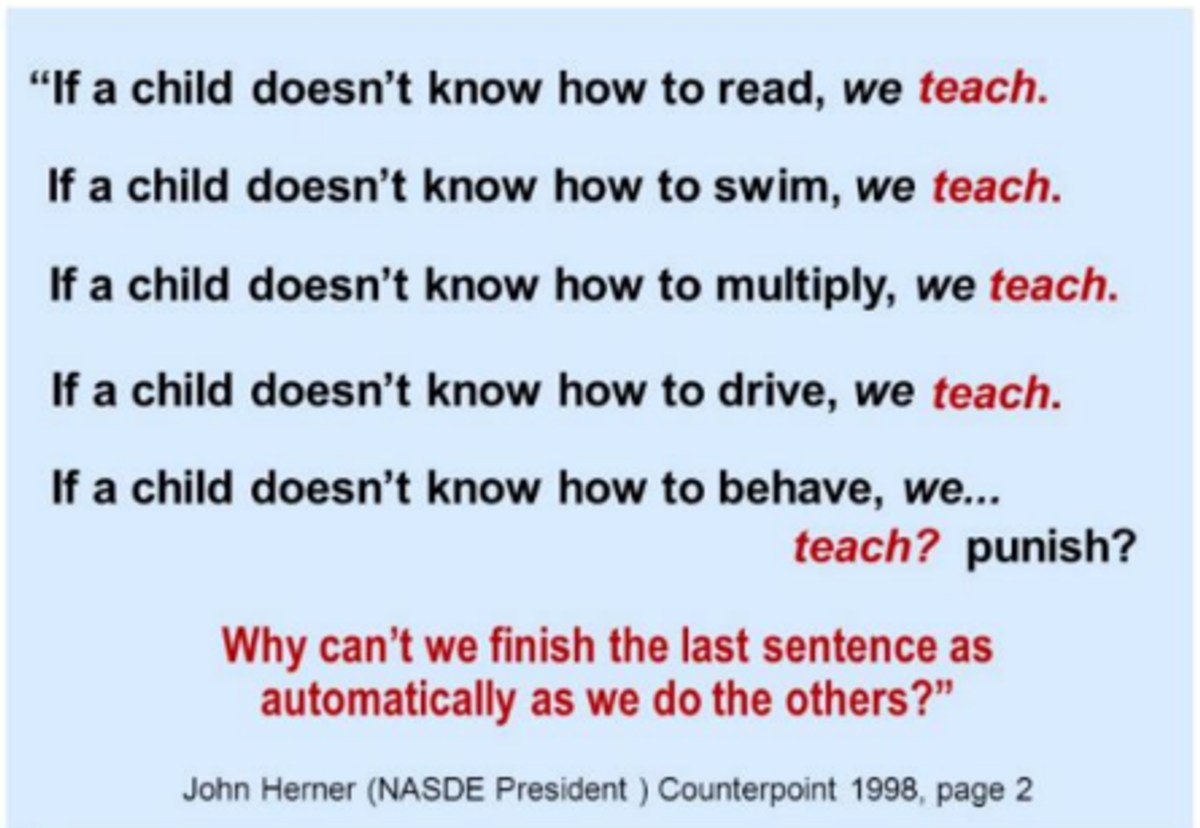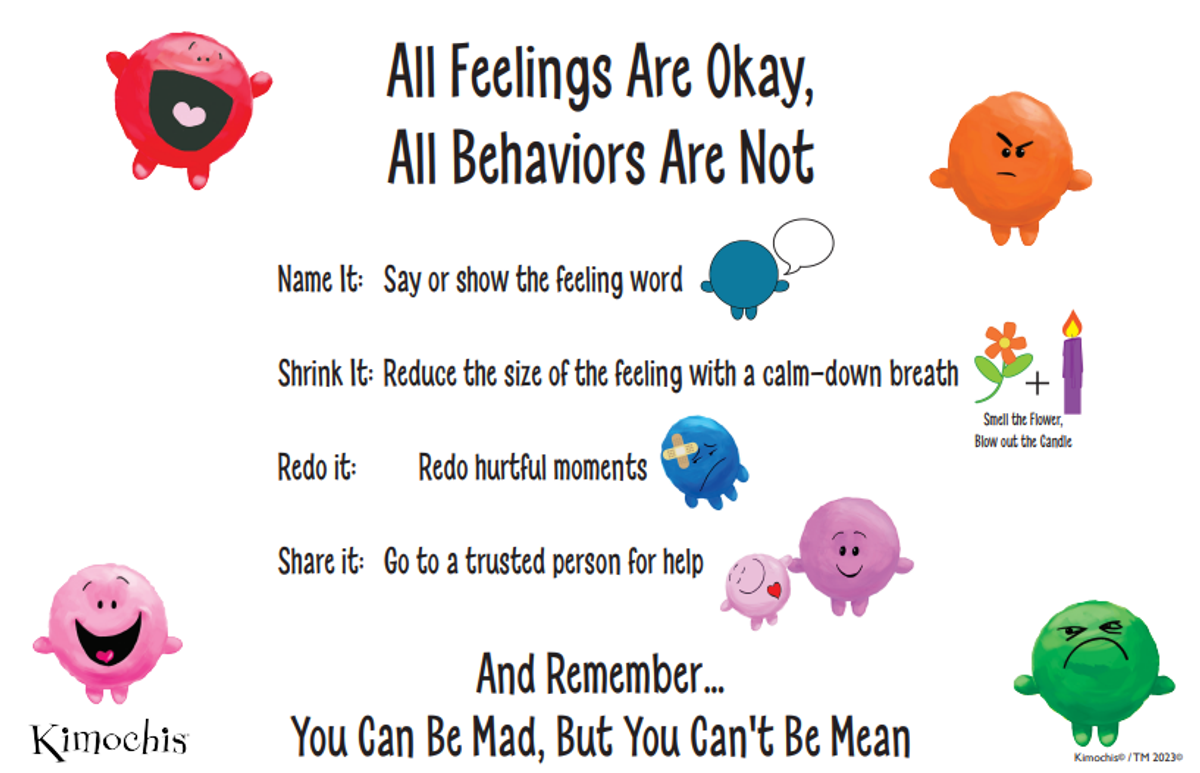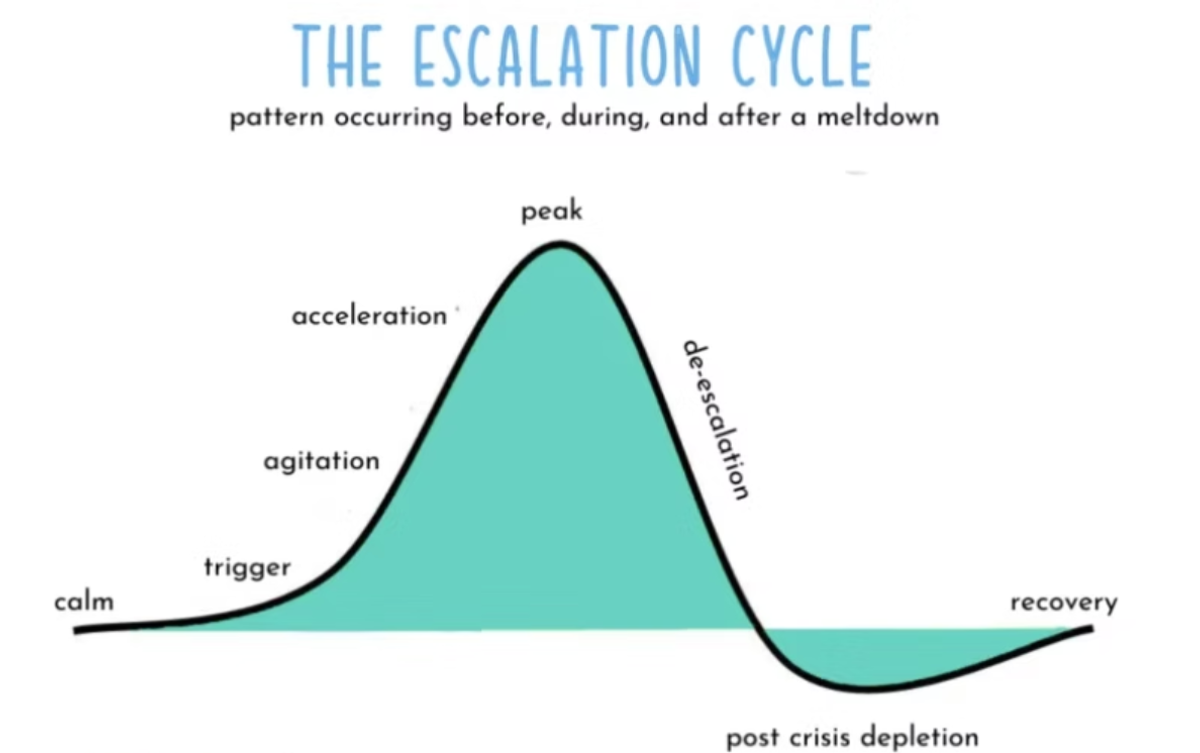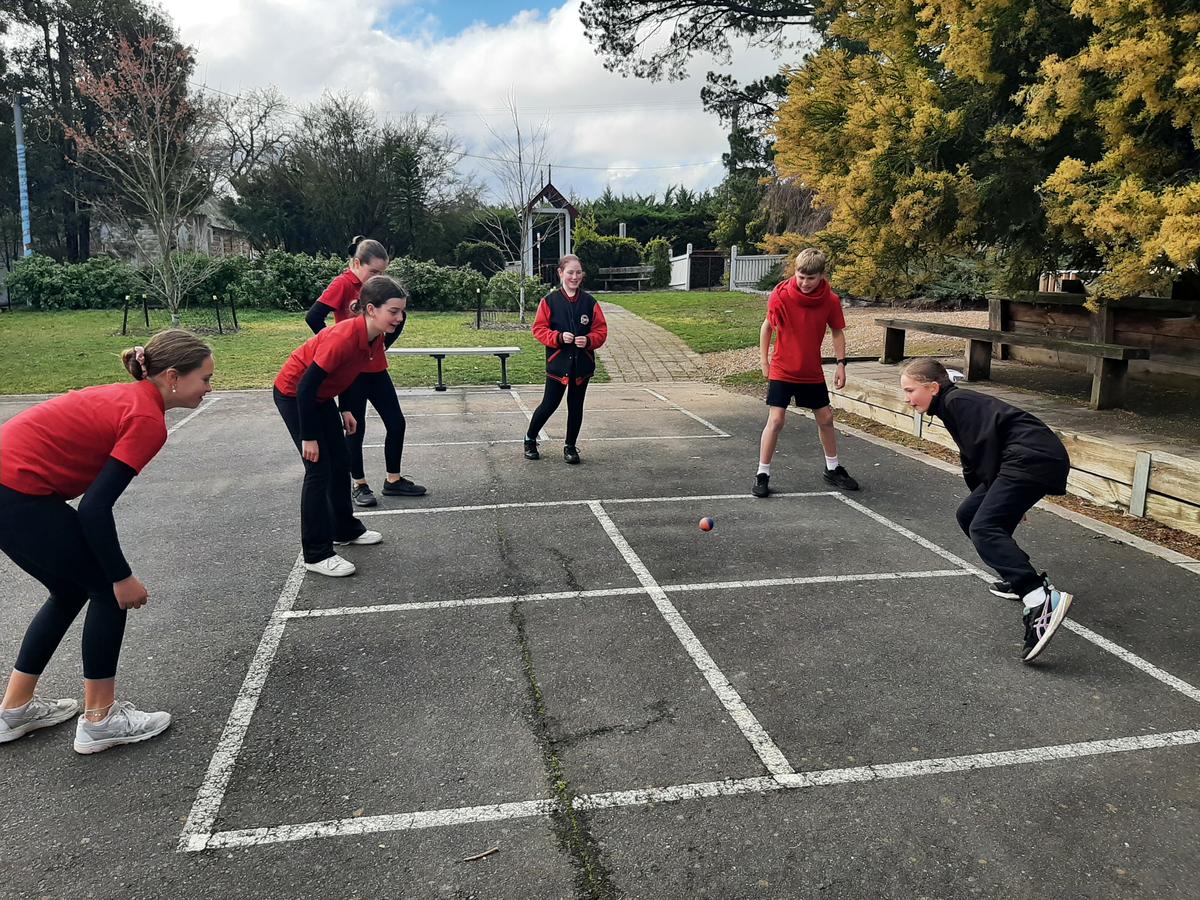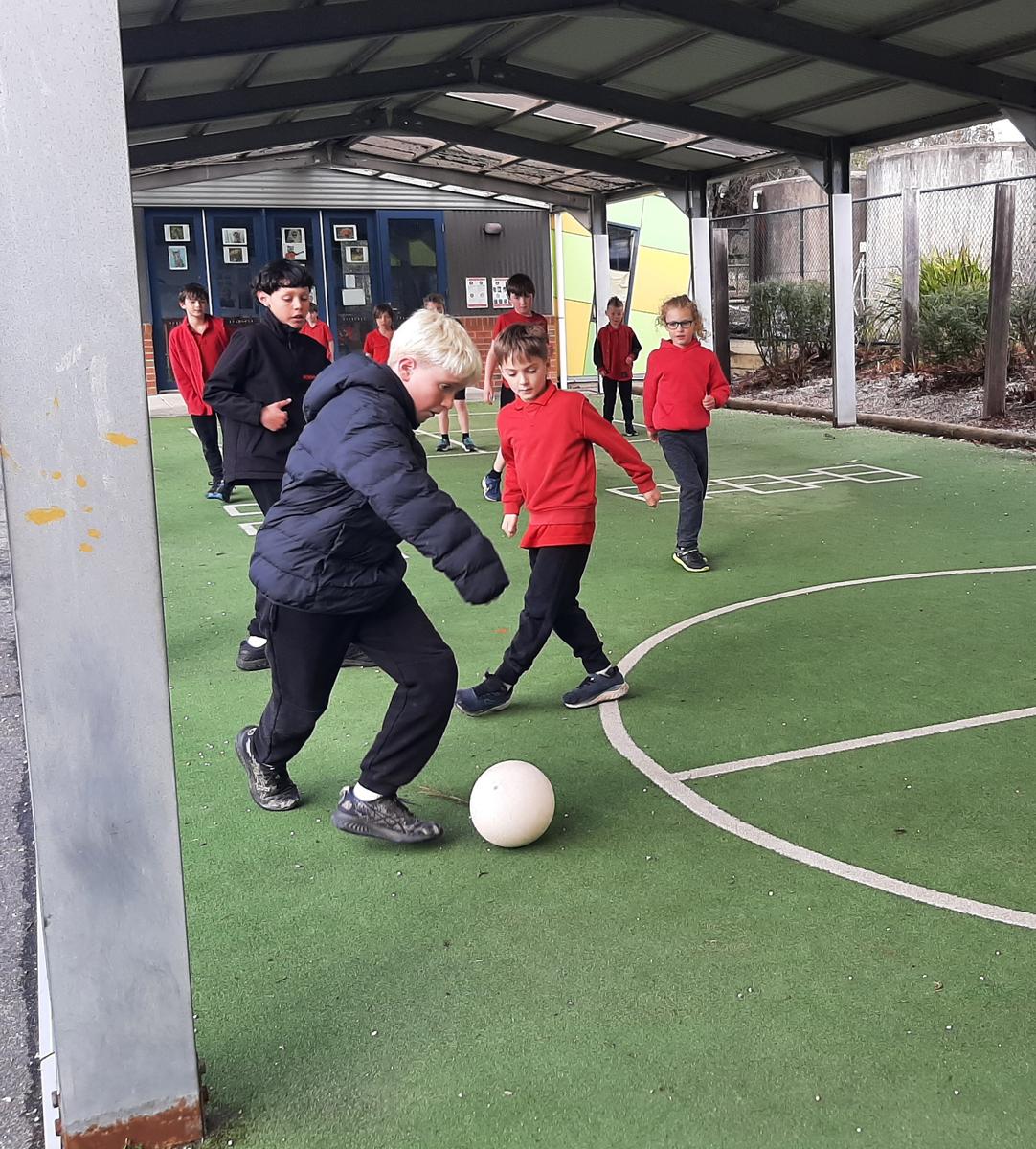Wellbeing

SWPBS Superstars
We had so much fun last Tuesday celebrating our success with positive behaviours with some robot wars and kahoot trivia. On the afternoon, we saw so much joyous teamwork, problem-solving, encouragement and bounce-backs from disappointment. All a testament to the students' ability to live our school values.
Also, a huge bravo to the students who achieved 20 value cards and received their certificate at assembly last week. We appreciate your marvellous choices!
SWPBS Update
SWPBS Essential Feature 3: Clarifying Expected Behaviours
At Newham PS, we have our core values of Excellence, Respect, Responsibility, Unity and Resilience. The community was involved in choosing these values and developing our matrix. This document outlines in positive terms how students are expected to show each of these values around the school. Additionally, whole school and classroom routines are clarified and agreed on by teachers and students.
Essential Feature 4: Teaching Expected Behaviours
This is absolutely core to the SWPBS approach. As adults, we sometimes assume that children will just absorb social skills because they have become so second nature to us. However, just like with any skill, explicitly teaching children expected behaviours gets the best outcomes. At NPS, we prioritise teaching students our expectations and routines at the beginning of each year, and review these as needed with whole classes, small groups and individual students throughout the following terms. We explain the reason and purpose of expectations and routines, model them and support students to practise them. Our Social Emotional Learning lessons, guided by Kimochis, also help us to understand, practise and meet expectations.
Body Image and Eating Disorders Awareness Week
This national week is celebrated annually in the first full week of September (1-7 Sep this year). 1 in 10 people in Australia will experience an eating disorder in their lifetime. So it's a good chance to share some great resources. The Embrace Collective have good ones for families. Here's a 5 mins video of tips on supporting better body image from the Embrace Collective for any parent:
Child Development & Wellbeing Information
This week: Responding to Big Feelings
Recommendations
Listen: Pop Culture Parenting Ep2: Terminator 2 + Responding to Emotions
Listen: Parental as Anything How to help your child manage emotions - This is a really nice discussion on stressors for kids and proactive strategies to help decrease the chance of blow ups.
Read: Co-regulation: Helping children and teens navigate big emotions - a good overview from Harvard Health. The steps and example scenario under the subheading How can a parent coach a child through co-regulation? is especially useful.
Watch: Co-regulation: What It Is and Why it Matters from the US Administration for Children and Families. This is a really great 5 mins overview of children's and teens' development of self-regulation and the role of trusted adult co-regulation.
Teacher Advice:
Role-Modelling & Self-Compassion
Children develop lots of their emotional regulation skills through the trusted caregiving adults around them. We can role-model strategies we use to cope by naming emotions we feel and "thinking aloud" or letting them know about a strategy we're using. That might look like saying "I'm getting really frustrated right now. Give me a moment, I need to take some breaths." I've done this in front of a class plenty of times!!
But even though we're the adult in the room, sometimes we aren't able to self-regulate. We try hard to, but it's important we have compassion for ourselves and our feelings too. We're imperfect humans. Even more so, it's incredibly powerful for children to see us role-modelling repairing things after a rupture. That might look and sound like: "I'm sorry I yelled at you before. I was really frustrated but I should have taken a breath before speaking to you. Can we try talking about it again now?"
Language we use at School
Hard-to-have and Nice-to-have Feelings
The Kimochis program teaches us that all feelings are ok. It's part of the human experience to feel the whole range of emotions. However, some are nice-to-have, like happy and loved, while others are hard-to-have, like embarrassed and mad.
Shrink & Grow Feelings
Our experience of feelings changes - sometimes we feel a little bit worried or mad and sometimes it's so huge it takes over everything else. We have agency to change the size of our feelings. We can use strategies to shrink hard-to-have feelings and to grow nice-to-have feelings.
All feelings are ok, all behaviours are not
This helps us separate the emotional experience from the action, and reinforce the idea that we can make choices about how we deal with hard-to-have feelings. It matters how we deal with them, because that affects the people around us. Our most useful related phrase to this is...It's ok to be mad but it's not ok to be mean.
Escalation Cycle
This model helps us to picture and plan for when big feelings take hold of a child. Thinking about the following questions and making a plan can help us as adults to respond calmly in the moment. This is a printout you could use - it's from Beyond Autism, but it's useful for any child experiencing big emotions.
Calm:
What does calm and happy look like for this child?
Triggers:
What triggers escalating feelings for them?
What can we proactively do to promote calm? (establish routines, heads up on changes, sensory tools, teaching and modelling of regulation tools/strategies for growing nice-to-have and shrinking hard-to-have feelings)
Early Escalation:
What are the early warning signs they are getting escalated? (things they say/do/look like)
What can we do/say to help redirect them at this point?
Peak escalation:
They can't take much language in and won't 'see reason'. Minimise words and use a calm tone and simple gestures. Give them space and time for the feeling to wash through.
Where is a safe place for this? What soothing tools might help? (e.g. toy, blanket, dark space)
De-escalation:
What are the signs they are de-escalating? You may subtly and quietly praise them here, like “I can see you’re getting back into your calm space” or "Really well done on shrinking that hard-to-have feeling." Continue to give them time and space.
Repair:
At a later time when they (and you!) are calm again, talk about what happened together. Start off by recognising a strength of theirs. Then say something like "that wasn't your moment before/yesterday." Name and discuss the feeling they experienced. Let them know having that feeling is ok and that you can feel that way sometimes too. Talk about where in their body they felt it. See if you can work out the trigger. You might talk about how the feeling was ok but that some of their actions were not - and why. Plan or review, and practise, 1-2 helpful strategies to manage the feeling constructively in the future, before it takes over.
Wellbeing in the Yard
Great to see students playing games in the yard showing our school value of Unity: all inclusive four square and a multi-age soccer game (Foundation to Year 5).
